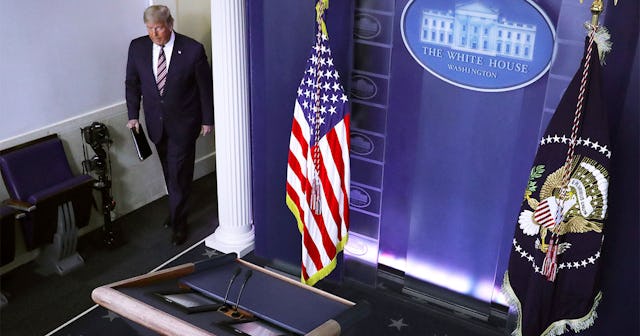Fun Fact: Trump Doesn’t Have To Concede In Order For Democracy To Carry On Without Him

You know how you have that one bulgy-eyed, conspiracy-obsessed, racist-but-doesn’t-know-it “friend” you used to know in high school on Facebook—that one who always posts in furious, ranting caps with multiple exclamation points after every sentence and needs everyone to know about “the deep state” and “rigged systems” and “the Wayfair cabinets”?
Isn’t it wild that the 45th president of the United States has so much in common with your raving friend?
LOL, I mean, wow. Somebody had a rough day.
Somehow, this person who lives in his own alternate reality, where the laws of physics and reason only apply when they benefit him, has headed the executive branch of our country for four years. The mind positively boggles.
Of course, everyone who saw the psychopathy and malignant narcissism predicted Trump wasn’t going to go easily. We knew getting enough votes to eject him would be an uphill battle too, since so many of his followers are as delusional and self-absorbed as he is. And we knew that even when we did vote him out, he would take every action possible to dig in his heels. If frivolous litigation were a language, Trump would be its most competent speaker. He struggles to finish a coherent sentence in English, but Frivolous Litigation, hey—that’s his native tongue.
So he’s attempting to drown Pennsylvania, Michigan, Georgia, and Arizona in legal battles in a bid to delay the electoral process. Normally, lawsuits get Trump what he wants. It’s literally how he does business. But a United States presidential election is not a real estate transaction, and his lawsuits are already failing. Judges are throwing them out due to lack of merit. He’s expected to demand a recount in Wisconsin, but experts are saying it would be unlikely to affect the result. Same goes for Georgia.
Trump’s antics remind me of that time when my son was little and learning to play Monopoly and, upon realizing he was losing, got so frustrated he flipped the board, ruining the game. This grown-ass man is trying to flip the board and ruin the game.
What does that mean for democracy—for the majority of American voters who chose Biden? How do we get Trump to admit he’s lost and vacate the White House?
Well, here’s a fun fact: We don’t have to get him to admit defeat. He doesn’t have to concede. Not verbally, and not on paper. It’s not required, and Biden will be president whether Mr. Sore Loser Crabby Pants gives a concession speech or not. Literally, Trump can go fuck himself.
I know. Isn’t that fun?
Here’s me trying to be as impartial about my reporting on Trump’s lawsuits and allegations of fraud: LOLOLOL no.
We’ve had enough. Enough lies, enough invitations to violence, enough bullying, enough racism. Enough. Sure, it would be nice if Trump would grow a shred of decency and concede as every president since the election of 1896 has done. It would be a solid acknowledgment of our collective faith in the stability, durability, and resilience of our democracy.
But, technically, we don’t need him to concede in order to transfer the office to Biden.
Chip Somodevilla/Getty
There is a process here. The U.S. government has a very specific timeline for how to go about this process—it’s federal law. The timeline allows enough time to resolve any disputes but also to provide a firm deadline so as not to interfere with or disrupt the function of our democracy. This process came about after a particularly prolonged and acrimonious battle for the White House in 1876 where it was unclear whether Samuel J. Tilden or Rutherford B. Hayes was the winner. In that tumultuous election, the compromise that led to Hayes’s eventual win was that the North would agree to pull troops from and end Reconstruction in the south. This move had a profoundly negative impact on integration efforts in the south because it ushered in a horrific and prolonged period of abuse and disenfranchisement of Black American citizens.
It was in response to that 1876 hullabaloo that congress enacted the Electoral Count Act of 1887. This federal law requires states to adhere to a uniform, step-by-step process with specific dates: The first deadline requires that any issues must be resolved within each state. This year, the deadline for this is December 8, 2020. Next, ballots must be cast by state electors—by December 14, 2020. Then, ballots must be delivered to the U.S. Senate—by December 23, 2020. Finally, on January 6, Congress will meet to determine the winner for any states with outstanding unresolved disputes.
These deadlines have been tested before. In the 2000 election between Al Gore and George W. Bush, the race was so close in Florida that the state did a recount. But Florida was still recounting its votes on December 12, 2000—that election year’s deadline for individual states resolving their issues. The U.S. Supreme Court ordered the count to stop, and Bush won by a razor-thin margin of 537 votes. Gore conceded.
The United States government has a process in place for how to manage election disputes. It is complex, but solid, and though Trump doesn’t have to like it, he does have to accept it. So do his followers. This is democracy. A gracious, dignified concession speech would be great, but we’re not counting on it, and it’s not required in order for this nation to carry on with our democracy without Trump.
Boy, bye.
This article was originally published on